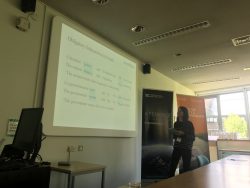Date: 21/06/2018
Amber Dudley is an SCDTP-funded PhD candidate in the Department of Modern Languages and linguistics at the University of Southampton. Her PhD research focuses on the second language acquisition and processing of complex grammatical structures and the associated implications for language learning and teaching, more generally.
On Thursday 17th May 2018, I hosted a graduate research workshop about ‘Language Development in Different Contexts’ at the University of Reading together with a fellow PhD student, Eloi Puig-Mayenco, from the University of Reading. Eloi and I had been talking for some time about organising a research day during which local PhD students would have the opportunity to present their research, regardless of what stage in the PhD they were, and receive feedback in an informal setting.

During the workshop, we heard from twelve students from the University of Southampton, Reading and Portsmouth, including four SCDTP-funded PhD candidates (James Corbet, James Turner, Amy Wallington and myself). Topics ranged from the cognitive and neurological effects of bilingualism to the acquisition of tense, aspect and mood in second and heritage language acquisition and the pedagogical implications. We even heard from one presenter who argued that empirical support for a ‘bilingual advantage’, which has been readily reported on in the media, may not necessarily be as robust as the media would claim. It was also great to see how much audience members engaged with the presentations, especially PhD supervisors who were even debating amongst themselves during the post-presentation discussions. On a personal level, I really enjoyed having the opportunity to present my research for the first time, especially at a stage when I am still trying to figure out the finer details of my experimental design. I received some valuable feedback about the methodology of my PhD that I will be able to implement before starting data collection. It was also interesting to meet PhD students from different institutions who are working on similar topics to myself.
Since the event was primarily aimed at PhD students, we wanted to minimise costs where possible. I therefore asked the SCDTP whether such an event would be eligible for the student-led training funding. In order to apply for this funding, I was asked to write a short business case outlining what I wanted to do, when and why, along with a budget. It was a fairly simple process and within a few days, I found out that my application had been successful. Thanks to this extra funding, we were able to offer coffee and light refreshments throughout the day, which were well received by workshop participants. Lunch was also provided at the event thanks to generous funding from the School of Psychology and Clinical Language Sciences and the Centre for Literacy and Multilingualism at the University of Reading.
Given the success of this year’s workshop, we hope to organise a similar event at the University of Southampton next year and invite students from different universities along the south coast to participate.